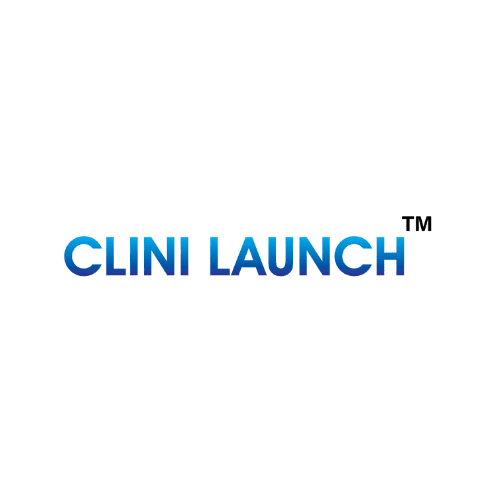Fuzzy Logic vs. Traditional AI: 5 Key Comparisons for Healthcare Efficiency

Introduction Artificial Intelligence (AI) is reshaping the healthcare industry, enhancing diagnosis, treatment, and patient care. From machine learning algorithms detecting diseases to robotic surgery assisting doctors, AI-driven innovations are making healthcare more efficient. However, not all AI systems function the same way. Traditional AI relies on strict rules and large datasets, making it highly effective for structured tasks. On the other hand, fuzzy logic provides a more flexible, human-like approach to decision-making by handling uncertainty and inaccuracy. This blog will explore the differences between fuzzy logic and traditional AI in healthcare, analyze their strengths and weaknesses, and determine which approach is better suited for different medical applications. Understanding Traditional AI in Healthcare What is Traditional AI? Traditional AI, including machine learning (ML) and deep learning (DL), relies on structured data and predefined rules to make decisions. These systems learn patterns from large datasets and make predictions based on past information. How Traditional AI Works in Healthcare Artificial intelligence is rapidly transforming the healthcare industry, with applications ranging from medical imaging to robotic surgery. AI-powered tools like IBM Watson and Google’s DeepMind are being used to analyze medical images such as X-rays, MRIs, and CT scans to detect diseases like cancer and fractures with greater accuracy and speed. Machine learning models are also being used to predict patient outcomes, such as the risk of heart disease, based on medical history and lifestyle factors. This allows for more personalized and proactive healthcare interventions. In the operating room, AI-assisted robotic systems are enhancing surgical precision and minimizing human error in complex procedures. These advancements are leading to improved patient outcomes, more efficient healthcare delivery, and a future where AI plays an integral role in medicine For instance, in England the implementation of AI tool called C the signs in GP practices increased cancer detection rates from 58.7% to 66.0%. Strengths of Traditional AI in Healthcare Despite its strengths, traditional AI struggles with uncertainty and incomplete data, which is where fuzzy logic in AI becomes advantageous. Enroll now: PG in AI & ML in Healthcare What is Fuzzy Logic in AI? Understanding Fuzzy Logic Fuzzy logic is an AI technique that impersonates human reasoning by dealing with uncertainty and inaccuracy. Unlike traditional AI, which relies on binary decisions (0 or 1, true or false), fuzzy logic in AI allows for intermediate values, considering various degrees of truth. For example, instead of labeling a patient’s temperature as simply “high” or “normal,” fuzzy logic might classify it as “slightly high,” “moderately high,” or “very high.” How Fuzzy Logic Works in Machine Learning & Healthcare It is a valuable tool in medicine due to its ability to handle uncertainty and make nuanced decisions. Fuzzy logic applications in healthcare helps doctors consider multiple overlapping symptoms and make more informed judgments in medical diagnosis. It also plays a significant role in drug dosing systems, where precise dosages are determined based on individual patient factors. Additionally, these applications are used in ICU monitoring to analyze fluctuating patient data in real-time and predict potential deterioration, enabling timely interventions. A study employing Fuzzy Cognitive Maps (FCMs) for coronary artery disease (CAD) prediction reported an accuracy of 78.2%, outperforming several modern classification algorithms. Strengths of Fuzzy Logic in Healthcare Key Differences: Fuzzy Logic vs. Traditional AI Feature Traditional AI Fuzzy Logic AI Decision-making Binary, rule-based Handles uncertainty & inaccuracy Data requirements Needs large datasets Works well with limited data Adaptability Less flexible to new conditions More adaptable to complex scenarios Human-like reasoning Imitate patterns, but strict Closer to human decision-making Medical Applications Radiology, disease prediction Diagnosis support, personalized treatment Key Takeaway: While traditional AI excels in structured tasks like medical imaging and automation, fuzzy logic in AI is better suited for decision-making under uncertainty and patient-specific care. Use Cases: When to Use Fuzzy Logic vs. Traditional AI When Traditional AI is Better AI is transforming healthcare in several keyways. One major application is in medical imaging analysis, where AI-powered deep learning models can analyze vast amounts of radiology scans to detect tumors or fractures with high accuracy. This can assist radiologists in making faster and more accurate diagnoses. Another important area is predictive modeling for diseases. Traditional AI models can analyze patient data, including medical history, lifestyle factors, and genetic information, to predict the likelihood of developing conditions like diabetes or heart disease. This allows for early interventions and personalized prevention strategies. AI is also being used to automate hospital workflows. This includes optimizing appointment scheduling, managing medical inventory, and streamlining administrative tasks. By automating these processes, hospitals can improve efficiency, reduce costs, and free up healthcare professionals to focus on patient care. When Fuzzy Logic in Healthcare is Better Fuzzy logic is a branch of mathematics that deals with uncertainty. It has been used in a variety of medical applications, including situations with incomplete data, personalized treatment plans, and ICU monitoring and decision support. In situations with incomplete data, fuzzy logic in healthcare can be used to make predictions even when some information is missing or uncertain. This can be helpful in cases where a patient’s medical history is incomplete or when test results are inconclusive. Fuzzy logic can also be used to create personalized treatment plans. By taking into account a patient’s individual characteristics and preferences, fuzzy logic can help doctors recommend the most effective course of treatment. In the ICU, fuzzy logic can be used to monitor patients and provide decision support to doctors. By analyzing a patient’s vital signs and other data, fuzzy logic in medicine can help doctors identify potential problems and make timely interventions. Hybrid Approach: Combining Fuzzy Logic & AI Many researchers advocate for a hybrid model that combines traditional AI with fuzzy logic in healthcare for optimal decision-making. For example: Read our blog post on AI and Healthcare: Enhancing remote patient monitoring in 2025 Challenges and Future of Fuzzy Logic in Healthcare AI Challenges of Fuzzy Logic in Healthcare Challenges of Traditional AI The Future of AI and Fuzzy
Breakthrough AI in Clinical Practice: Balancing Innovation & Ethics 2025
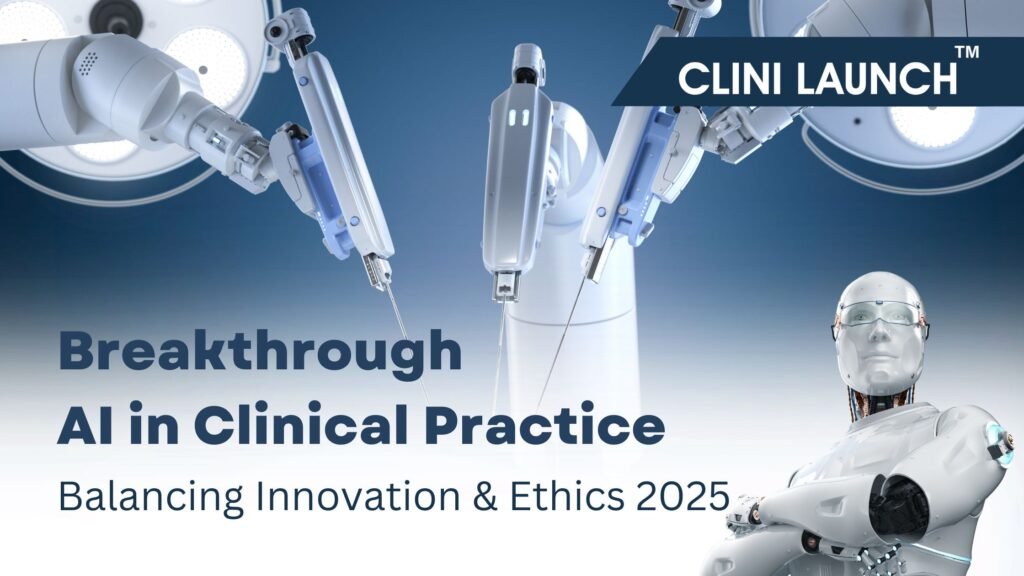
AI in clinical practice revolutionizing healthcare sector by enhancing efficiency and accuracy through advanced solutions. To gain deeper insights enroll today!
Integrated Machine Learning and AI in Biological Research
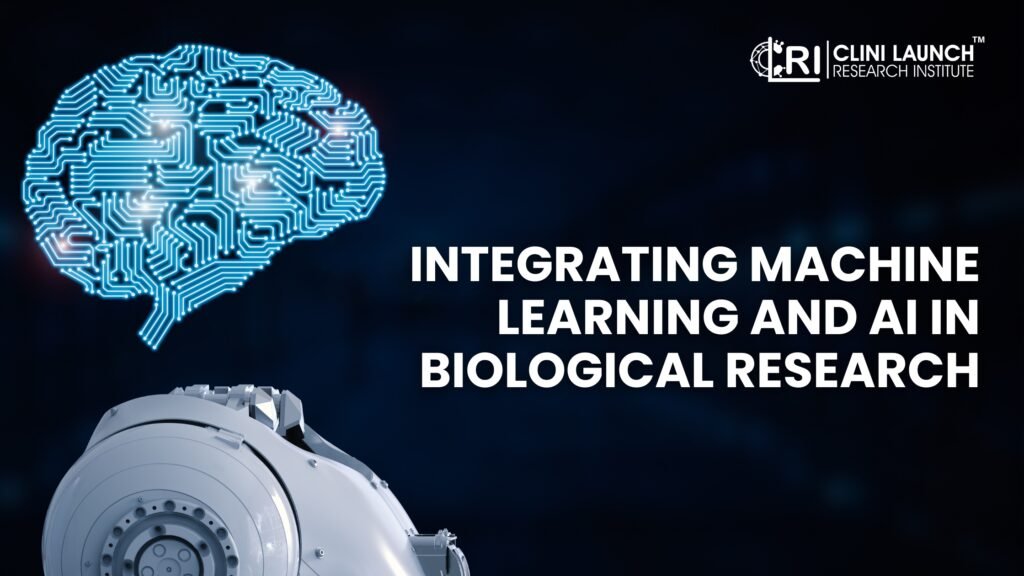
Want to know about machine learning and AI in biological research with its applications, data, and future scope for your career growth? Enjoy the read.
AI and Healthcare: Enhancing remote patient monitoring in 2025
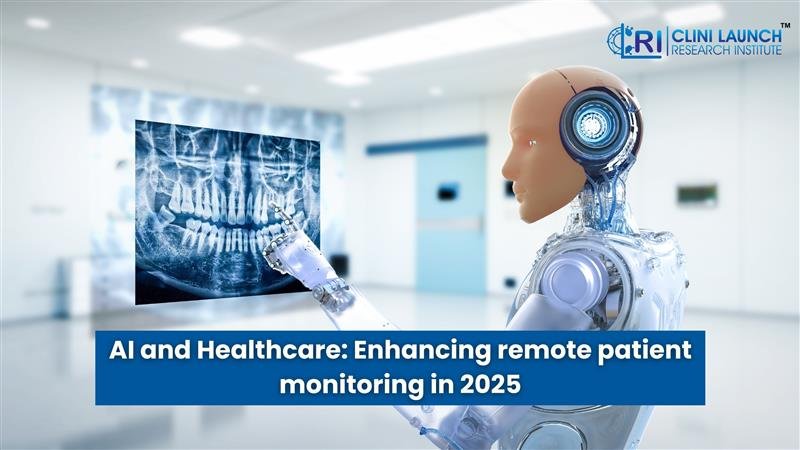
Discover about remote patient monitoring, AI and healthcare. Enhance your expertise with AI ML in healthcare with CliniLaunch. Enroll today!
Efficient Predictive Analytics in Medical Supply Chains

Improve operational decision-making, optimize inventory & staffing levels, manage their supply chains, and predict maintenance needs for medical equipment.
Identifying Patients with NLP AI and OCR: Clinical Trial Revolution 2025
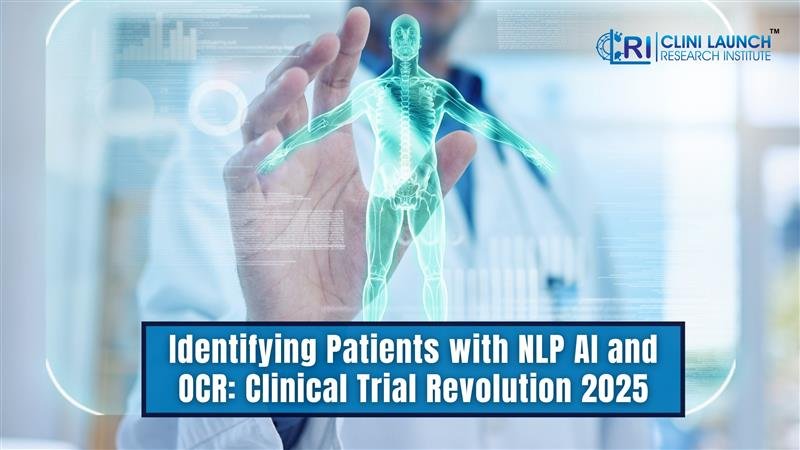
Revolutionizing Clinical Trials: Identifying Patients with NLP and Optical Character Recognition Clinical trials play a pivotal role in the development of new medical treatments and therapies. However, identifying eligible patients for these trials has historically been a complex, time-consuming process. The advent of artificial intelligence (AI) technologies, particularly NLP AI (Natural Language Processing Artificial Intelligence) and Optical Character Recognition (OCR), is transforming how researchers streamline patient identification, making it more efficient and effective. Optical character recognition is a very used technology which involves image processing and text extraction, they involve different tools and techniques which convert medical prescription images to text which is helping medical staff to do their job efficiently. Furthermore, Natural Language Processing Artificial Intelligence can help to reduce time and streamline the process by analysing medical trial records to understand who can meet trials criteria and who can not! Enroll for “AI ML in Healthcare” Understanding the Impact of NLP AI and OCR in Clinical Trials Credit: Md Aayan Ansari (Graphic Designer) Natural language processing AI and OCR are two groundbreaking technologies that can extract and process data from unstructured text sources, such as medical records, to identify suitable candidates. It can also reduce the time it takes to start a trial by analyzing patients’ history. NLP also can identify potential drug molecules/candidates for new therapy innovation and drug-drug interaction. Natural Language Processing is a branch of Artificial Intelligence focusing on enabling machines to understand, interpret, and generate human language. It can analyze medical texts, such as physician notes, pathology reports, and discharge summaries, to extract relevant information about a patient’s medical history and conditions. Whether Optical Character Recognition, converts scanned documents and images into machine-readable text. This capability is very much essential in the medical field when dealing with handwritten notes or older paper-based medical records, allowing data to be digitized and searchable. By combining both NLPAI and OCR,the coordinators can rapidly scan through vast datasets to find eligible patients based on predefined criteria which is mainly reducing turnaround time for this process and also making healthcare providers job much easier by keeping track of health medications, dosages, and frequency of intake, all with the convenience of digital technology. Read our blog post on: “5 AI ML in Healthcare Censored Projects” How NLP AI Enhances Patient Identification Credit: Md Aayan Ansari (Graphic Designer) NLP AI improves patient identification in the following ways: Benefits of Optical Character Recognition OCR complements NLPAI by digitizing physical documents and making them searchable. Key benefits include: The Clinical Trial Phases and using NLP AI and OCR for Clinical Trial Phases Management Clinical trials are vast research, which involves different phages. Below are the four main phases: Each phase involves managing large volumes of patient data, and NLPAI and OCR technologies can be game changers in efficiently handling this information. Read our blog post on: “AI in Healthcare Certification Program: An Amazing Spotlight” NLP AI and OCR for Clinical Trial Phases Management Natural language processor AI and OCR helping in all the four stages of clinical research as mentioned below: Phase I: NLPAI can be used to identify healthy volunteers from existing datasets. Phase II: NLP can help in finding patients with specific conditions by scanning through their EHRs for inclusion/exclusion criteria. Phase III: Large-scale trials benefit from NLP AI’s ability to process vast datasets for suitable candidates across multiple sites. Phase IV: Long-term patient monitoring can be facilitated using NLPAI for ongoing data analysis from health records. Implementing Natural Language Processing with Python Python is a leading programming language for implementing natural language processing applications due to its robust libraries. Popular Python libraries for NLPAI include: The Future with NLP AI and OCR Credit: Md Aayan Ansari (Graphic Designer) The integration of NLPAI and OCR technologies holds immense potential for the future of clinical trials. By automating patient identification and data extraction, these tools can: Conclusion The use of NLP AI and Optical Character Recognition is revolutionizing how patients are identified. These technologies help healthcare providers streamline data extraction from both structured and unstructured sources, ensuring faster and more accurate patient matching. As natural language processing with Python continues to evolve, it offers powerful tools for automating key aspects, making research faster, smarter, and more inclusive. By embracing NLPAI and OCR, the medical research field can improve both the speed and quality, ultimately leading to faster development of life-saving treatments and drugs. To learn more about these fascinating topics please visit our website CliniLaunch, At CliniLaunch we are providing high quality AL ML in healthcare courses along with Clinical Research and Clinical SAS courses.
AI for Healthcare Course: 5 Effective Impact of AI Adoption
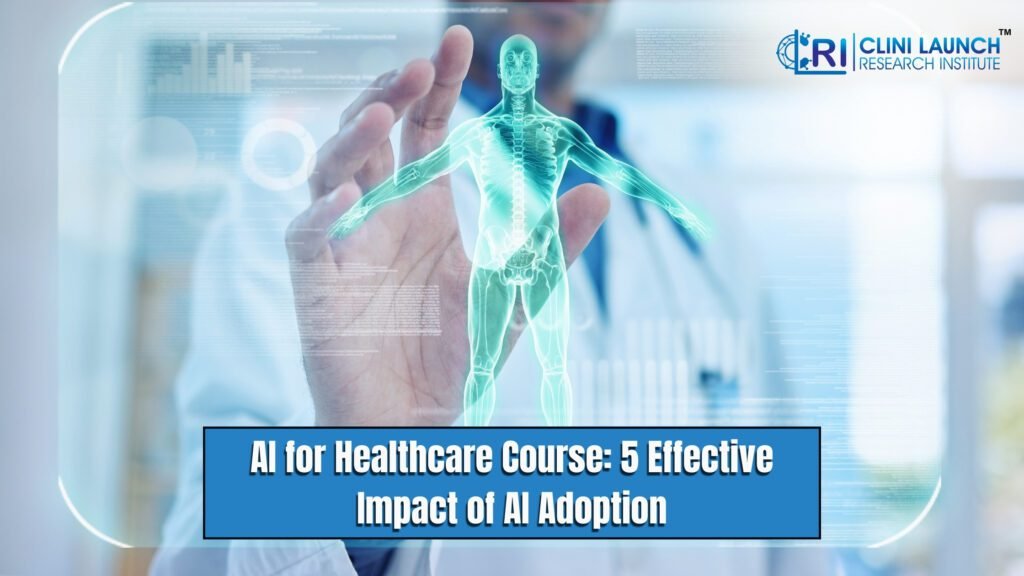
The healthcare industry is undergoing a significant transformation, driven by the rapid adoption of artificial intelligence (AI). AI technologies, particularly those taught through comprehensive AI for Healthcare Courses, are revolutionizing how healthcare systems operate. By converting routine tasks to automation, analyzing complex data, and supporting clinical decision-making, AI is addressing longstanding challenges such as resource allocation, patient wait times, and medical errors. Institutes offering specialized AI and ML in healthcare training in India are equipping professionals with the tools to navigate this transformative landscape. Here in this blog, I am exploring different tasks and responsibilities that AI is reshaping in healthcare operations through improved administrative workflows, patient management, medical diagnostics, supply chain management, and clinical workflows. These advances demonstrate how AI technology in healthcare is not just enhancing operations but redefining the future of healthcare delivery. Scroll down to know more about artificial Intelligence and Healthcare. Enroll for “AI and ML in Healthcare Classes”. 1.AI Technology in Healthcare: Optimizing Administrative Tasks Healthcare organizations often grapple with administrative burdens, from managing patient records, patients schedule treatment to scheduling appointments. AI technology providing solutions, emphasized in AI for Healthcare Courses, are transforming these operations. Technologies like natural language processing (NLP) and robotic process automation (RPA) streamline workflows by automating repetitive tasks such as billing and insurance claims. For instance, tools taught in AI Healthcare Courses enable healthcare providers to extract and organize data from doctors notes and medical histories. By adopting such advanced systems, staff can focus on more critical tasks, boosting overall efficiency and reducing turnaround time. 2. AI for Healthcare Course: Improving Patient Management One of the most significant impacts of AI technology in healthcare lies in enhancing patient management and patient care. Predictive analytics, a key focus of AI and ML in healthcare training institutes in India, allows healthcare providers to anticipate patient needs and design personalized care plans. These capabilities enable healthcare professionals to intervene early, improving outcomes and reducing hospital readmissions. Chatbots and virtual assistants, powered by AI, are taking the patient engagement into a next level. These tools offer 24/7 live support, answer queries, and remind patients about medications, making healthcare more accessible and efficient to everyone. This integration of artificial intelligence and healthcare fosters better communication and patient adherence to treatment plans. 3. Artificial Intelligence: Enhancing Diagnostics and Decision-Making AI is proving indispensable in diagnostics, particularly through its application in medical imaging , clinical decision-making and personalised medical treatment. Machine learning models, a critical component of AI for Healthcare Courses, analyze medical images with utmost accuracy, enabling early detection of acute diseases like cancer and heart conditions. Moreover, decision-support systems guided by AI provide healthcare professionals with evidence-based treatment recommendations for better treatment plans. These advancements, emphasized in AI Healthcare Courses, demonstrate how AI technology in healthcare enhances diagnostic precision and reduces the cognitive burden on clinicians. Read a blog post on “Advanced Machine Learning in Medical Imaging Classified 2024”. 4. AI Healthcare Course: Streamlining Clinical Workflows AI-powered tools support clinical decision-making by prioritizing cases based on urgency, ensuring that patients with critical conditions receive prompt attention. By integrating artificial intelligence and healthcare, providers can maintain high standards of care while focusing on patient-centric operations. AI is also revolutionizing clinical workflows by automating routine tasks and optimizing resource allocation. Wearable devices and IoT-enabled monitoring systems, integral topics in AI for Healthcare Courses, collect and analyze patient data in real time. These tools provide timely alerts to healthcare providers, improving efficiency and reducing manual monitoring efforts. 5. Transforming Supply Chain Management Effective supply chain management is vital to healthcare operations, and AI is optimizing this domain by predicting demand and improving inventory management. Institutes offering AI and ML in healthcare training in India teach professionals how to leverage AI to analyze historical and real-time data for efficient resource allocation for healthcare needs. By implementing AI-driven inventory systems, healthcare organizations can ensure that critical supplies are available when needed or not, minimizing waste and lowering costs. During the COVID-19 pandemic, the ability of AI technology in healthcare to predict demand surges showcased its immense value in managing healthcare crises. Enroll for “AI and ML in Healthcare Classes”. Conclusion The adoption of AI in healthcare operations, fueled by knowledge from AI Healthcare Courses, is transforming the industry into a more efficient, patient-centered ecosystem. To fully realize these benefits, healthcare professionals must embrace learning opportunities provided by top AI and ML in healthcare training institutes in India. These programs ensure that professionals are equipped to navigate the ethical, technical, and operational challenges of integrating AI technology in healthcare. Discover the future of clinical operation and AI specialization with CliniLaunch, your trusted partner in streamlining healthcare workflows. Empower your team with cutting-edge AI-driven solutions and professional medical related courses. Whether you’re a healthcare provider, researcher, or administrator, CliniLaunch provides the tools you need to improve efficiency. Contact us today and see how CliniLaunch can revolutionize your clinical operations for a smarter, faster, and more effective tomorrow. Enroll now!
Captivating AI Machine Learning Certification: Your Guide for 2025
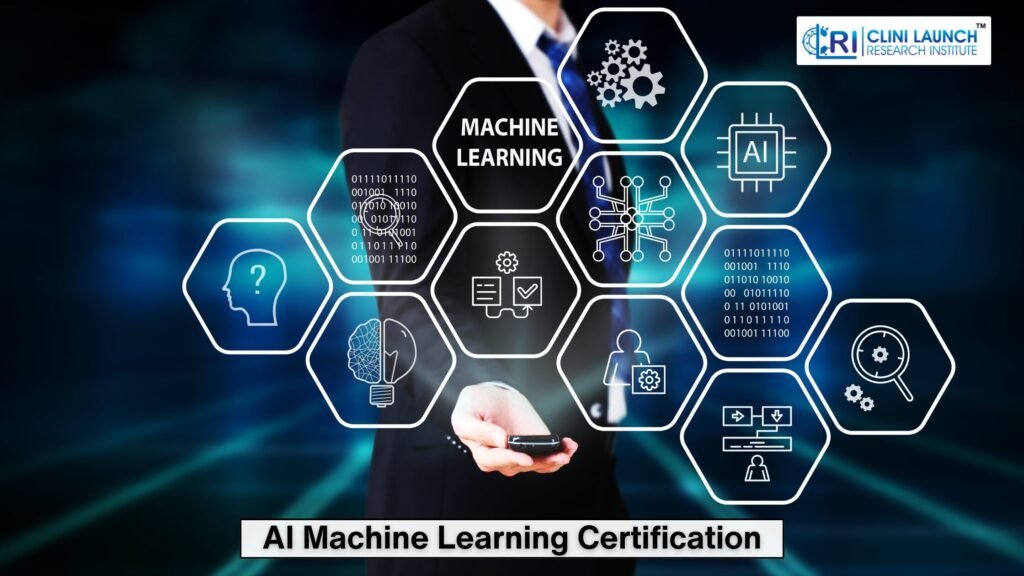
Grow your AI & Machine Learning skills with CliniLaunch’s AI Machine Learning Certification course with interactive-Lab sessions and latest techniques.
Artificial Intelligence AI in Healthcare: 7 Condemning Evolutions
Get to know the in-depths of healthcare and how this domain is revolutionizing the use of Artificial Intelligence AI in healthcare for a better future!
Is an MBA in Hospital Management A Lucrative Career Path?

If you are a passionate healthcare professional and ready for your next step, dream big, make a change in innovation, and make an impact on patients lives! A Masters in Business Administration (MBA) in Healthcare Management can be a powerful tool to transform your career and enhance your leadership quality in the healthcare domain. An MBA in hospital management bridges the gap between business expertise and medical knowledge, playing a crucial role in patient care. As health administration masters responsibilities grow, effective leadership ensures the availability of providers, resources, and funding to meet patient needs. This program equips MBA healthcare professionals to tackle these challenges, fostering strong leadership skills to drive healthcare advancements. To unlock your leadership potential and enhance your future career in healthcare, enrolling for an MBA in hospital and healthcare management empowers you to achieve your goals. To know more, enrol for MBA in healthcare management What is MBA in Hospital Management? An MBA in Hospital and healthcare management is a specific tailored business degree course mainly focusing on administration and leadership domain of healthcare industry. It provides extensive knowledge to students to blend business principles with healthcare operations, covering numerous topics such as healthcare policies, financial management, strategic planning, human resources, and marketing. Earning a degree in MBA hospital administration will help you understand the details regarding different aspects to manage healthcare and hospital settings. This specially tailored program prepares students to effectively manage hospital resources, optimise patient health, and navigate complexities of the healthcare domain. Freshers and graduates are armed to take on leadership roles in clinics, institutes, hospitals, pharmaceutical industries, and healthcare industries, improving patient outcomes, and driving the overall success of healthcare institutions. Scope and Recognition of MBA in Hospital Management Credit: Karthik C (Graphic Designer at CliniLaunch) An MBA in Healthcare Management can help job searchers in the healthcare domain by offering a combination of business expertise and healthcare knowledge. Over the years, there have been a lot of expectations and demands in this healthcare administrative sector. Recently at Indeed job portail 4000+ jobs were posted for the healthcare manager role in the healthcare sector. By completing MBA in healthcare program one can get into various different leading professional and management roles, including: Benefits of MBA in Healthcare Management Credit: Karthik C (Graphic Designer at CliniLaunch) An MBA health administration masters program offers numerous benefits to professionals and healthcare providers along with freshers to make a lasting impact on the healthcare industry. To explore how this degree can transform your professional journey take a closer look at the benefits: Flexible Schedule In MBA in healthcare management one of the key benefits is the study timing schedules. You can have your online courses at your preferred timing. You can select timing and schedules for MBA courses as per your convenience. As there is no fixed timings and schedules you can get enrol to courses that prefer your prior commitment such as work, family and others. Read our blog post : MBA Health Management Work-Life Balance The structure of an MBA in hospital management program is designed to fit around your ongoing professional work. Which will allow you to continue in your current job role while pursuing the management program.You can apply your hands-on real time experience to your on-going job, reinforcing your skills and tackling workplace challenges. Thus you can manage your work life balance as per your tailored course which in long run helps you grow professionally by reinforcing your learning without taking a career break, enhancing your effectiveness and boosting career advancement. Diverse Career Opportunities Post completion of an MBA in hospital and healthcare management opens doors to numerous career opportunities which were out of reach previously. The MBA in healthcare management program provides you with extencive business and management skills applicable to various opportunities in the healthcare sector. Freshers, graduates and proffesionals can pursue roles such as Health Services Manager, Project coordinator, Healthcare Marketing Manager, Pharmaceutical Project Manager, and much more. These profesional roles broaden the expertise in this field, including strategic planning, hospital management, and marketing strategies, positioning individuals for enhancing and advancement of new opportunities in the healthcare domain. To know more, enrol for MBA in healthcare management Job Opportunity and Salary Post completing an MBA health administration masters, one can have a list of different professional roles with competitive salary expectations. These MBA in healthcare roles span across different sectors providing various opportunities and expand your skills in the healthcare horizon. The salary offering for various professional roles depend upon your experience, project collaboration, course credibility and internship you have done. Few job roles such as health information manager, hospital CEO can bag high income such as INR 8L to 40L annually. Some senior roles such as financial analyst, operational manager, clinical manager, hospital financial manager can bag an income ranging from 4 Lakhs to 10 Lakhs annually. These health administration masters cover a variety of industries, giving candidates lots of chances to put their abilities to use and succeed in the fast-paced world of healthcare administration. Your experience, collaborative projects, work functions, program reputation, and other factors will affect the final pay call. One of the most significant takeaways from this blog is that it is always preferable to learn from a reputed institute, work on a project, do an internship, work part time for experience depending on your timetable. This additional experience can help your CV stand out to the world’s leading multinational corporations and recruiters. Dual Specialization Programs from CliniLaunch Credit: Karthik C (Graphic Designer at CliniLaunch) MBA in hospital management programs will provide you advancement in your career by advancing your knowledge. You can enrol for an executive MBA in hospital administration and healthcare management, you will be getting the advantage to pursue one more specialisation. CliniLaunch offers specialisations and the courses are IAO, LSSSDC, NSDC, and IAF accredited. These courses are affiliated with Grade A++ NAAC accredited Bangalore University. Healthcare Management (Major) In this course we are offering a major course
